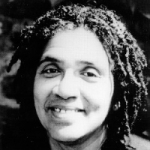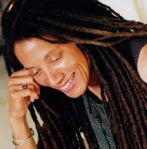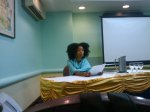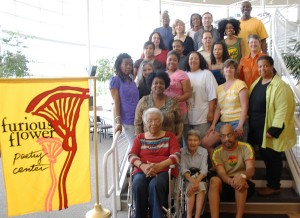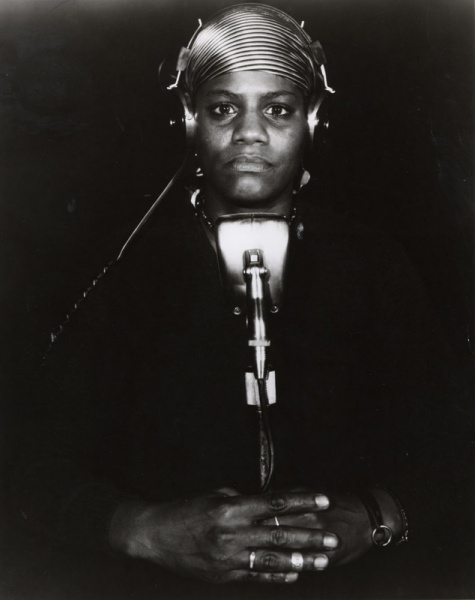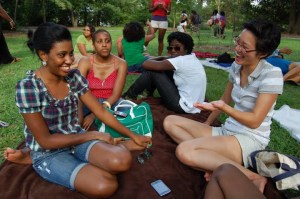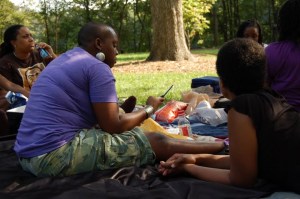Hi Everyone,
This is the text of a talk I gave a few days ago at the Center for Lesbian and Gay Studies at CUNY as part of an event called Rare Form.
Would love to know what you think!
love,
lex
I want to take a moment to remember the place we are in, and to remember, Audre Lorde, Toni Cade Bambara, and June Jordan who taught in the City University of New York’s SEEK opportunity program and participated in the student takeover of City College. I remember this in solidarity with the recent direct actions of the students in the University of California System.
I have to acknowledge what makes it possible for me to speak here. I am the beneficiary of generations of the righteous anger of people of color critiquing and transforming institutions and demanding space.
*This paper is dedicated to June Jordan’s mentor Fannie Lou Hamer whose birthday is October 6th and to the oldest black woman I know, my father’s godmother, cousin Floss, a self-identified “very outspoken person” who uses these words as a refrain to her ongoing critique of everything: “When ya wrong, ya wrong.”
Your Mother:
June Jordan and the Orchestration of Anger
Alexis Pauline Gumbs
Can we agree that anger is useful? We are often told that anger, especially when enacted by black women is pointless, ridiculous, amusing. A pre-existing condition. But black women’s anger must be useful. Why else would there be a weapon in the arsenal of the volunteer army of white supremacy listed on the first page of their guidebook called “the angry black woman.” Beware the angry black woman, the stalwart defenders of racism, classism and sexism are trained, pretend that her anger is spontaneous, primal, guttural, alien, anything to shift the conversation away from what she is angry about. That angry black woman must be saying something pretty dangerous to have earned her own stereotype. But fear not. Our anger is useful, and we, have our own handbook. Audre Lorde’s “The Uses of Anger: Women Responding to Racism.” Audre Lorde teaches us why the anger of women of color is valuable:
“Anger is loaded with information and energy….Focused with precision it can become a powerful source of energy serving progress and change. Anger expressed and translated into action in the service of our vision and our future is a liberating and strengthening act of clarification.”
“Women of Color in America have grown up within a symphony of anger, at being silenced, at being unchosen, at knowing that when we survive it is in spite of a world that takes for granted our lack of humanness, and which hates our very existence outside its service. And I say symphony rather than cacophony , because we have had to learn to orchestrate those furies so they do not tear us apart.”
So this is a question of form. We have had to learn to orchestrate those furies so they do not tear us apart. I think there might be people in here who can relate to that. And some say that it was the work metabolizing hatred within academic and activist spaces, even with this university system that took them from us early. Some say it was also the lack of stable and comprehensive healthcare. In each case, this practice of orchestrating our anger so that it does not tear us apart, is not a mere literary exercise. Our survival is at stake.
So tonight, I’m going to be looking closely at some examples of the orchestration of anger by one of the angriest black feminists I know about, someone who was incredibly concerned with form: the poet, June Jordan. As the first person to spend time in the unpublished papers and correspondence of June Jordan at the Schlesinger library I read angry letter after angry letter and it is clear to me that Jordan’s anger is not spontaneous, and it is not cacophonous. This anger is orchestrated.
I would propose that June Jordan’s angry letters, especially to editors within the periodical publishing industry constitute a shadow archive, an actual body of work that we can read for it’s own insights, its robust and consistent critique of the publishing industry and it’s own poetics which can bear on our reading of Jordan’s angry published poems. (The “your mama” poem she wrote for Daniel P. Moynihan comes to mind.) If racism slept, unfortunately it doesn’t, but if racism slept, it would have nightmares about June Jordan. June Jordan is the proof of the fearsome power of the angry black woman.
And in the popular imaginary the angry black woman has a form too. The form of black woman most associated with anger is the black single mother. The person most associated with everything bad, irrational, detrimental, and scary in the popular rhetoric of the United States is the single black mother. And my work is about this connection. The thing that is so queer and so dangerous about the single, or poor, or queer black mother is that she will not shut up, will not stop standing up for hers, will not simply disappear and stop making more race problems, by which we know it is meant, stop making more problematic black people. Let me be clear, the story about the angry black woman is about fear of the power of black woman, about fear of what we can and do create. Which is, on the level of body and discourse, what Hortense Spillers calls an intervening narrative. The black mother is criminalized, as crazy, loud, angry, irresponsible, because she stands at a precarious place in the social narrative, right on the social tension over the meaning of reproduction. And June Jordan says, here I am. Be afraid. As a black sometimes poor, sometimes single and sometimes woman-partnered mother, who was also an author and journalist troubled this intersectional tension even more explicitly. So if the media of the late 20th century when Jordan was writing was committed to reproducing narrative common sense about the worthlessness of black life, the expendability of black bodies in post-industrial New York, the justification of an expanding prison state and the responsibility of black mothers for the “culture of poverty” crime and inequality, Jordan was clearly committed to something else. This is the queer thing. This is why Cathy Cohen asks for a queer politic that centers and highlights the “welfare queen.” Point blank. In a society that thinks and says and enforces the idea that black people do not deserve to exist, it is a queer thing to create and love and nurture and uplift and listen to and empower a black child. Black mothering is queer work.
In this context queer black feminist mothers June Jordan insisted in the pages of Essence Magazine, that “Poems are housework.” The form of black mothering is a queer form and form matters. Jordan framed her critique of the New York Times, Chrysalis Feminist Publication and Seven Days publication…which I will focus on here….in her perspective as a black mother who saw racism as a life or death matter. June Jordan as a someone who understood ideological racism as an act of violence, actively reproduced through the practices of the publishing industry (on TOP of the actual racist content they continued to publish.) So this is where I am coming from. This is where I come from, this legacy where creation is a queer thing, where mothering retains its deviance. The place where accountability to silenced ancestors and children who public policy says should not be born explodes into voice.
Hatred destroys. But anger and hatred are not the same. And as Lorde explains, anger is an appropriate response to hatred.
June Jordan was not afraid to be angry.
This is the place where people like those of us on this panel…who are obsessed with form get very excited. We are out and proud, we cherish an intimacy with words. We are all creative writers, we all read closely, in context. And by close here I mean intimacy. And I have to say there is something really thrilling almost electric about becoming intimate with words so full of passion and rage. Sharp words designed to slice someone out of their racist apparel on my behalf. There must be something queer about that.
I am going to start with my favorite letter actually as I was writing this I realized that I have so much to say about this letter that I won’t even have time to talk about the other letters here.
Here is the context: (it’s a little bit gossipy and involved, but I need you to know that anger doesn’t come from nowhere)
In the late 1970’s Audre Lorde was poetry editor of a “magazine of women’s culture” called Chrysalis. June Jordan was a contributing editor. Adrienne Rich was also a contributing editor, and then there was a (white feminist) editorial board. So (to be clear) there were the “advising editors” and Lorde as poetry editor who ostenisibly had input into the magazine and then there was an all white set of women who made the day to day and final decisions and there were no women of color in that room. A number of important pieces, including Lorde’s essay “Poetry is Not a Luxury “and appropriately, as you will see, June Jordan’s poem “I Must Become a Menace to My Enemies.” Lorde used her role as poetry editor to highlight poetry by emergent women of color writers, but from the beginning the editorial collective, which was based in LA and the far-flung poetry editor had communication issues, and from the very first issue Patricia Jones, a black woman writer, complained in a letter to the editor that it seemed that women of color were marginalized within the magazine. As poetry editor, Audre Lorde had a critique of the magazine that specifically centered around poetic form and space. In October 1977 Audre Lorde wrote a letter (really a small essay ) complaining expressing her frustration with the Chrysalis collective for devaluing poetry. The third issue of the publication had only 9 pages of poetry, but it had 11 pages of blank space, used ostensibly to provide transitions between articles. Lorde was most distressed by the fact that two poems by June Jordan however we crowded onto the same page, which Lorde complained gave the misperception that they were parts of the same poem and “nullified the impact of each one.” Lorde copied June Jordan on this letter. It might be the case that Jordan herself had complained to Lorde about the way that her poems appeared on the page. In a letter the next year to her new publisher Beacon Press, Jordan insists that her poetry should get the same space the Seamus Heaney’s got, increasing the projected page-length of Passion to over a hundred pages.
In 1979 the Chrysalis collective received a National Endowment for the Arts grant to produce a special issue on poetry. By this time however, Lorde was fed up with the collective and had resigned as poetry editor, an act which was covered up the collective which published a special poem in honor of Audre Lorde and continued to list her on the masthead months after she had resigned. So Lorde wrote another angry letter, this time structured with numbers. She starts with the marker of second wave feminism and questions its very existence through her critique “If the personal is indeed political then grave questions are raised by your printing a poem to me under a paragraph of factual errors and insults to contributors at the same time as the editorial board is apparently unable to deal with me as a peer.” Lorde highlights three points that she says have fallen on deaf ears in the past.
1. critiques the objectification “thingdom” of black women in the magazine, particularly in response to what she sees as a fetishistic racist article about primitivism in women’s art
2. protests the expendability (superfluity) of work by women of color within the magazine, pointing out that the one poem by a woman of color that was to be included, a poem by Toi Derricote’s was missing from the issue…she predicts that the board will respond “we never noticed”
3. and finally the Lorde protects her own authority. She is angry to have her name associated with “a poetic composition over which I have no control.”
These three issues, objectification, expendability and authority are the exact issues which are contested in that narrative about black mothering and the reproduction of racism. Lorde’s at bottom Lorde is making an accusation. You are stifling the poetic work of women of color because you are afraid of what we will create. Remember the uses of anger. Here in list format, Lorde orchestrates that anger at being unchosen, that anger at being objectified and used.
“Jordan, in solidarity and frustration wrote this letter.
Read the whole letter.
Clearly this is not written in the form of a poem. It is written in the form of a formal letter. Almost in the form of a contract, she uses the word “hereby” begins the last sentence with the word “as.” The poetics of rage also make this letter a poem. Listen to the repetition, of the key words. Black and profoundly. This is a profoundly black feminist letter.
Jordan brings the important topics of labor, mothering, and state violence explicitly into the conversation and points out the connection between the personal miscommunications within the publication, the ideological violence in the magazine’s content exclusions and editorial policies and the state violence that this narrative violence reproduces. After Susan Griffin, spokesperson at that time for the Chrysalis editorial board, failed to respond to either Lorde or Jordan’s letters and instead wrote a long pleading letter Adrienne Rich, who had also resigned in alliance and agreement with Lorde and Jordan’s accusations of racism…rudely merely cc’ing Lorde and Jordan on what remained an exchange between two white women and, as you can imagine, incensing Jordan in particular even more, Jordan makes her connection between the ideological violence of the publication and the violence of racism and imperialism writ large even more explicit:
She writes “I am most angrily and disgustedly hereby confirmed in my viewpoint that Chrysalis and its allies do not fail Black and Third world people by accident. It is a failure guaranteed by a concept of identity that excludes my own, in the broad sense of my own.”
She goes on to elaborate on “the process whereby persons such as S. G. may avoid indefinitely, it would seem, an adult and serious consideration of her particular responsibility for the fact that I must tremble for the survival likelihood of every young Black man in this country, including that of my own son.” Jordan then describes listening, in public to a radio report about “yet another white police murder of an unarmed young Black man,” in her neighborhood and sincerely thinking that this time it might be her son.
This is the brilliance of June Jordan’s anger. For Jordan everything is connected. Accountability is always on the level of life or death. This is one of the reasons that Jordan gained a reputation, especially among her liberal peers for being so “difficult” and uncompromising. A racist editorial policy is never just a racist editorial process for Jordan. Because it is racist narrative that the media reproduces in it’s mechanics and with its content allows a collective common sense, that among other things enables the public to accept the actions of a police force that treats black people as if they are not human beings, but monsters to be shot on sight. Jordan’s anger is instructive in its logic and its clarity, even if it may depend on a binary. No incident is isolated, every practice, every decision we take on either reproduces an oppressive framework, or helps to produce something different…on the terms of the civil rights mantra, if you are not part of the solution you are part of the problem. We could talk about the ethics of Jordan’s anger in conversations with work on ethic by Levinas, and Judith Butler. But we won’t. Because for one, it’s really past time for me to be talking, as advertised about the poetics of Jordan’s anger, and for two, I have decided that at least for tonight all of the theorists that I will quote, cite or talk about will be black women. So there.
Now, let’s look at the poetics:
If the racism of Chrysalis is like a death sentence to the black community…which seems to be the claim Jordan is making, she breaks out of the narrative structure of the sentence, even while parodying it with the contract like language of the letter, by breaking out into repetitive incantatory reveries.
Black women issues, Black women priorities, Black women poets
And on. The impact is cumulative and magical. It is almost as if the exclusion, tokenism, expendability and pigeon-holing of black women within the publication is undone by the spell that she is working in this first paragraph. In contrast to the publication, this paragraph is full of diverse black women, and not only that,
We have black women political analysts, black women storytellers, black women activists, black women laborers, black women mothers. We have black women that create, shape worlds, make meanings. This is not the first time the repetition of black shows up in Jordan’s body of angry letters. 10 years earlier in 1969 she had responded to a proto-bell curve pseudo-scientific article in the New York Times magazine about how black people are not capable of rational thought, with an eloquent letter with the refrain “Because I am Black.” Basically saying, because I am black I do not understand what could possibly be rational about you printing this trash to begin with. So here in the 1979 letter, the repetition of Black, capital BE and women lower-case W breaks out of the marginalizing assumption that black woman is just a slot to be filled. Or that by tokenizing black women on the advisory board but not taking their advice seriously you are somehow an inclusive publication. Remembering that “our very existence is hated outside of it’s service to the system” Jordan chooses excess, it’s raining black women hallelujah, black womanhood is so multiple it is a song. This is poet…we start with alliteration and move to rhyme, priorities, poets, painters, analysts, activists, mothers, lovers. This is a call. Suddenly the space is filled with black women, black women past present and future are called, attracted by the aesthetic, spirit crowds the discourse. This repetition, Black women, Black women, Black women, hails Fannie Lou Hamer back from beyond the grave, it hails me. Eleven times
Black women
Black women
Black women
Black women
Black women
Black women
Black women
Black women
Black women
Black women
Black women
Loving black women over and over again, day in a day out is a queer thing. This in a letter addressed to the white editorial board of Chrysalis, and then copied to Adrienne Rich, who Jordan understood to be an actively anti-racist white feminist ally, and 5 black women, Audre Lorde “my sister” Alexis DeVeaux and Gwendolen Hardwick the black women poet and artist who were attacked on the street with Jordan, Patricia Jones, the black woman who wrote the first angry letter about racism to the magazine and Barbara Smith, who as we know is a lifetime warrior for autonomous women of color publishing. Black women everything at the center of the paragraph. This is poetic because it says what we do not know how know. Right in the center of anger there it is resplendent. Ecstatic, evangelical, transformative love for self.
You cannot read this letter without knowing for sure, that June Jordan loves black women enough to fight for our existence. All Audre Lorde had to do was cc her on the letter. Beware the fierce love between black women. Profound. Jordan’s use in the next paragraph of the repeated word profoundly also make a language break. The sentence, or indictment begins in standard sentence structure, commas punctuate the accusations, hopelessly academic, pseudo-historical, incestuous. But then the failure is just too profound for the dominant language to hold. The commas drop out and the word profoundly hold the rhythm. Profoundly optional (I really love that, how a magazine that treats the lives of black women as an under prioritized “option” becomes “optional.”) Think about that for a minute. You imagine if someone called you that? Profoundly Optional. I really think that’s the most cutting point in the letter. Optional. Damn.
Alright. So profoundly holds the rhythm. Profoundly optional profoundly trifling and this is a turning point. Because you know where we are by the time we get to the word trifling, This is school-yard. This is what Jordan called black English in her classroom. No commas needed bring it home.
Profoundly upper middle-class attic white publication.
And then here is the thing that I love the most. After explaining why the publication is so dead ridiculous and optional that it need not even exist, she then actually proposes that the people publish the letter in the magazine! And this isn’t the only place she does this…after a back and forth between June Jordan and the editors of the magazine Seven Days about an article that she wrote about the outrage of a mob murder of black youth in Brooklyn, where they ask her to be less angry and more balanced, she tells them off and says if you want your readers to really know what’s going on, print this letter and give me my kill fee.
And this is a poetic act too. Sylvia Wynter, the genius Jamaican literary critic explains that the poetic is the way we make an capitalist relationship where objects relate to objects through the mediator of power obsolete, and imagine a different world by describing a relationship that cannot be described. And this is Jordan’s gesture at the end of these angry poetic queerly carefully crafted letters. You who know nothing of what publishing should be, publish this. A catch 22, if the words in the letter are true then we know they would never publish such a critique. If the words in the letter are not true then how can the publication participate in it’s own slander. I entirely expect that you will print this, she says. By which she means I dare you. I dare you. Not just to the recipient, but now to us. The shadow audience overhearing her love for us, carbon-copied. And the anger of black women is like that, a shadow archive of stolen love daring us to be afraid. And now you know about it. So what you gon’ do?











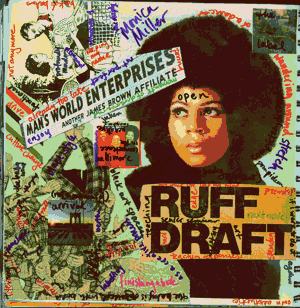

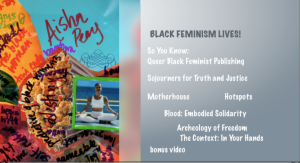 Eternal Summer DVD of black feminist educational videos (available on a sliding scale fee for use in your community or classroom.) Paypal a donation between $11-25 to brokenbeautifulpress@gmail.com for your copy. shipping included!)
Eternal Summer DVD of black feminist educational videos (available on a sliding scale fee for use in your community or classroom.) Paypal a donation between $11-25 to brokenbeautifulpress@gmail.com for your copy. shipping included!)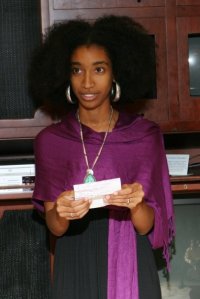 This year Lex is using her best developed and most cherished skill
This year Lex is using her best developed and most cherished skill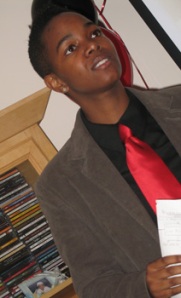

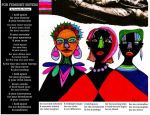 Combahee Lives!
Combahee Lives!
